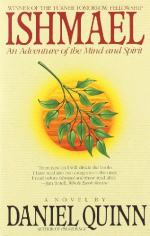
|
| Name: _________________________ | Period: ___________________ |
This test consists of 15 multiple choice questions and 5 short answer questions.
Multiple Choice Questions
1. What does the narrator find on the arm of his chair during his third dialogue with Ishmael?
(a) A camera
(b) A notebook
(c) A tape recorder
(d) An ax
2. What does Ishmael say made Germans captive under Hitler?
(a) Hitler’s charisma
(b) Hitler’s violence
(c) Hitler’s story about the Aryan people
(d) Hitler’s international support
3. In Chapter 4, how does the narrator say men used to live before they became men?
(a) Like the chosen creatures
(b) Like every other creature
(c) Like the least noble creatures
(d) He says that they were always men
4. How does Ishmael say the gods must have seen the world before man, according to the narrator’s culture’s story?
(a) Unfinished
(b) Abandoned
(c) Perfect
(d) Ruined
5. What terms do Ishmael’s terms ‘Takers’ and ‘Leavers’ correspond to?
(a) Adults and children
(b) Rich and poor
(c) Civilized and primitive
(d) First world and third world
6. How long ago did the Takers’ story come into existence?
(a) 2,000 years ago
(b) 10-12 thousand years ago
(c) 20-30 thousand years ago
(d) 200-300 years ago
7. What does Ishmael elicit from the narrator in Chapter 4 regarding his creation myth?
(a) That his creation myth is centered on mankind
(b) That his creation myth is damaging the earth
(c) That his creation myth is founded on falsehoods
(d) That his creation myth excludes the perspective of women
8. What has the narrator’s coldness become, now that he mentions it to Ishmael a second time, at the end of Chapter 5?
(a) A symbol
(b) A character
(c) A trope
(d) A motif
9. What does the narrator say the ad in Chapter 1 was looking for?
(a) Someone who wanted to teach
(b) Someone who wanted to work with gorillas
(c) Someone who wanted to change the world
(d) Someone who wanted to make an investment
10. What does the narrator say was removed when man learned to farm?
(a) The temptation to control nature
(b) The limitations of the hunter-gatherer lifestyle
(c) The need to have respect for animals
(d) The desire for earthly paradise
11. Upon answering the ad, what does the narrator say he finds in the room when he goes in?
(a) A phonograph
(b) A bookcase
(c) A stove
(d) A set of tools
12. What role does Ishmael say the Fertile Crescent plays in the narrator’s story?
(a) Center of the world
(b) A distraction
(c) Legendary birthplace of agriculture
(d) The birthplace of culture
13. What is a koan?
(a) A secret.
(b) A spur to meditation
(c) A riddle
(d) A paradox
14. What does the narrator say, in Chapter 6, is the problem with his culture’s story?
(a) The narrator says that there has been a strong conservation movement, opposing industrial progress
(b) The narrator says that conquering the earth has meant destroying it
(c) The narrator says that conquering the earth has provided freedoms that are worth the earth’s destruction.
(d) The narrator says that technology has sped up the destruction of the earth so much that no one can stop it
15. What does the narrator say is his first impression of Ishmael?
(a) Terror
(b) Curiosity
(c) Tenderness
(d) Comfort
Short Answer Questions
1. How long ago did the Leavers’ story come into existence?
2. What distinction does Ishmael point out between Leaver and Taker cultures?
3. What does the narrator answer when Ishmael asks him, in Chapter 5, what man’s destiny is?
4. What does the narrator say he does with the newspaper the first time he reads Ishmael’s ad?
5. What does the narrator say grew where his idealism had died?
|
This section contains 628 words (approx. 3 pages at 300 words per page) |

|




